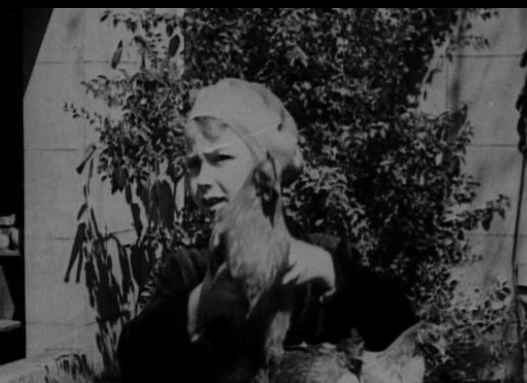Friday Links, March 26, 2021
Summary: Flannery's birthday; Flannery on PBS; Finding Christ in the Karamazovs; fictional fractals; Dana Gioia on poetry.
Happy Birthday, Mary Flannery O'ConnorBorn March 25, 1925, the Feast of the Annunciationin Savannah, Georgia
At this Open Culture post is a link to the famous British Pathé Newsreel about the pet chicken that little Savannah-born Mary O'Connor taught to walk backwards. The tiny flash of fame set her on a determined quest for a repeat. The page also has her account—first published in Holiday magazine (I read it in my mother's copy of the magazine in 1961!)—of how the newsreel led her seek to acquire more freaky birds. As most of know—she ended with a veritable herd of peacocks chorusing their raucous calls all over the farm and dusting up her mother's rose bushes.
Flannery—Available on Live-Stream
We mentioned last week that this PBS documentary would premiere on 3/23/2021. For those who may have missed it, the good news is that the show is available for streaming until 4/21/2021. Even after reading everything I could about her life since I first discovered her writings sixty years ago, I learned a lot from this.
Finding Christ Among the Karamazovs
Katy Carl, Dappled Things Editor in Chief, recommends this essay by Paul Contino at Church Life Journal—which is an excerpt from Contino's book Dostoevsky's Incarnational Realism: Finding Christ Among the Karamazovs. Contino starts with a quote from Pope Francis recommending Dostoevsky to everyone.
I believe that for all of us [Dostoevsky] is an author that we must read and reread due to his wisdom."—Pope Francis
Scientists Find Great Works of Literature are ‘Fractals’
Karen Barbre Ullo, former DT Managing Editor, recommends this article, "The explanation isn’t very satisfying, but the concept is very interesting." Katy Carl also likes the idea. I also found it not explained at all well, but I agree, yes, the concept is interesting.
Researchers studied over 100 works of literature, including Finnegan’s Wake, was well as texts by Dickens, Shakespeare, Dumas, Thomas Mann, Umberto Eco, Samuel Beckett, Henry James and many more. What they discovered was shocking: mathematical consistency, even that they were structured like fractals."
What is Poetry? 10 observations about the art (Dana Gioia)
Fr. Michael Rennier, DT Web Editor and contributor, writes about this, "adding to my to-watch list." It's the first in a series of introductory talks by Dana Gioia on the art of poetry.
The most ancient art, poetry emerged before writing as a form of song—speech shaped for music effect. It uses every means by which language communicates to create a particular meaning and effect. By studying poetry you'll understand how to use the full power and range of language. Poetry also reminds us that the physical sound and rhythm of words are parts of their meaning. The form a statement takes becomes part of its meaning. In this video I make 10 observations about poetry formed over a lifetime of reading and writing it. For more videos on poetry you can subscribe to my YouTube channel here."
I watched the first video and appreciated learning how Gioia looks at the subject, but I liked it rather distantly. I then watched his second video How to Analyze a Poem: a close reading of W.B. Yeats' poem "Lake Isle of Innisfree." Gioia's last sentences on top of all those that came before opened me into being a fervent Yeats admirer, as if Gioia turned a key in a lock. The whole series is being posted here.





